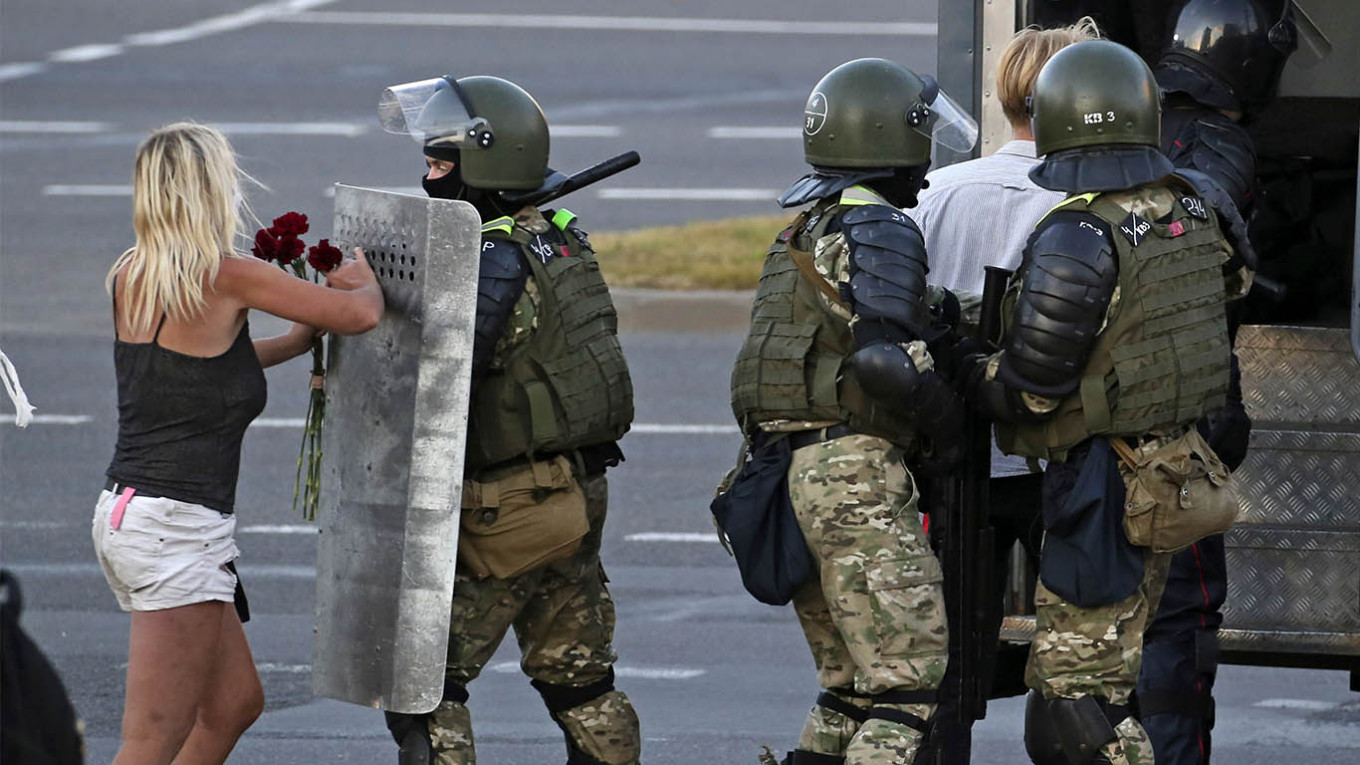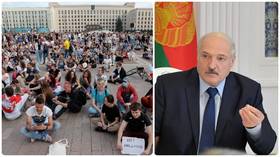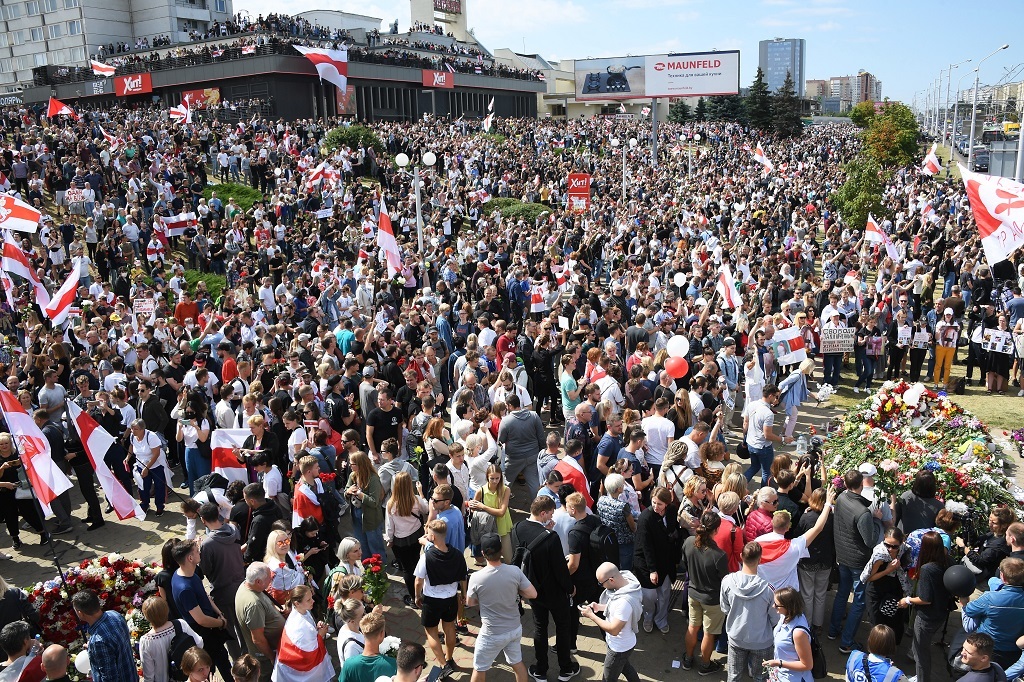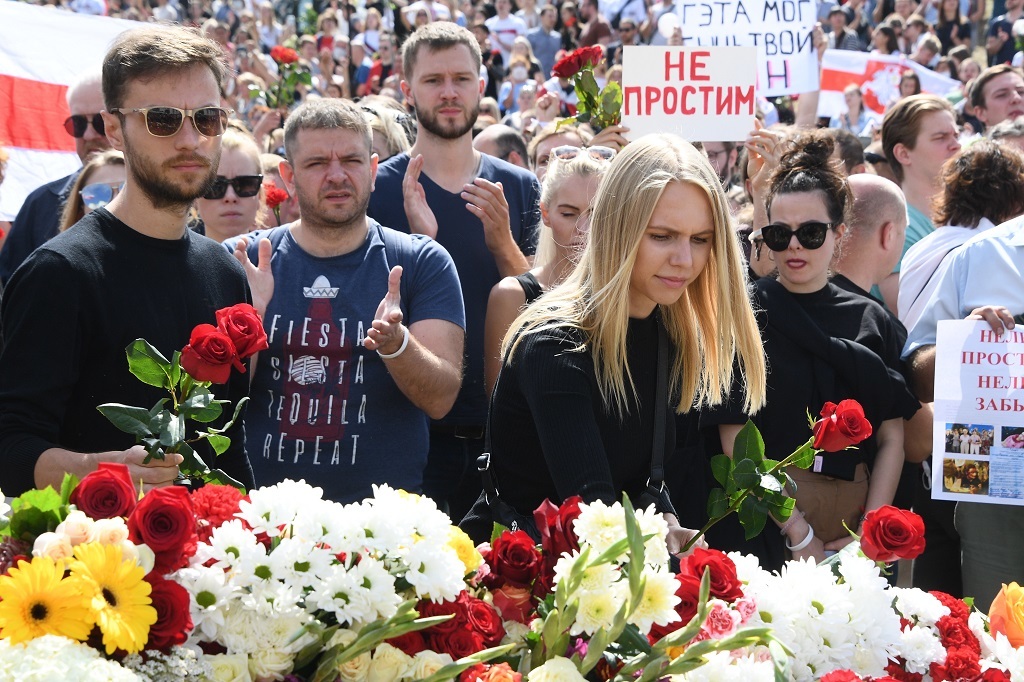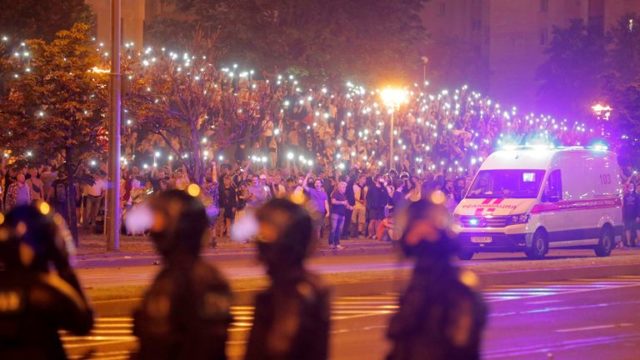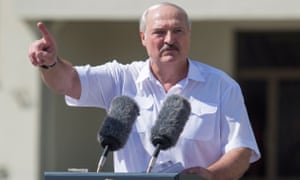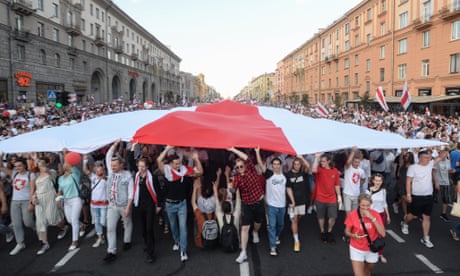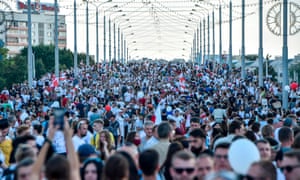
Russian President Vladimir Putin attends a meeting via video conference at the Novo-Ogaryovo residence outside Moscow, Russia, Thursday, July 30, 2020. (Alexei Nikolsky, Sputnik, Kremlin Pool Photo via AP)
By ELI LAKE |
August 16, 2020
Russian President Vladimir Putin knows how to troll. In the midst of a democratic uprising in Belarus, in which thousands of citizens have taken to the streets to reject last weekend’s stolen election, Putin offered the nation’s struggling dictator his congratulations.
“I hope your state activity will facilitate mutually beneficial Russian-Belarusian relations in all areas, deepen cooperation within the Union State, and build up integration processes,” he wrote in a congratulatory telegram to Alexander Lukashenko on Monday.
Putin likes autocrats, of course. But Lukashenko has gone out of his way to defy Putin in recent years. In April 2019, he expelled the Russian ambassador to Belarus, accusing him of treating his country as a Russian province. In December, he secured a $500 million infrastructure loan from the China Development Bank. In July, his regime arrested 33 men he accused of being Russian mercenaries fomenting discord ahead of this month’s election.
What makes this a master troll, however, is Putin’s mention of “mutually beneficial Russian-Belarussian relations.” Lukashenko has publicly rejected the Kremlin’s proposal for a closer union between the two Slavic states. This year, the two countries failed to reach an agreement on crude oil exports to Belarus, dealing a blow to the country’s command-and-control economy, which relied on the revenue generated by refining Russian crude and selling it on the European market.
So what exactly is Putin up to? Lukashenko, who has ruled Belarus for a quarter of a century, is in serious trouble. After he claimed victory with 80% of the vote in last weekend’s election, his country erupted in protest. Demonstrations persist despite a nationwide internet blackout. Why would Putin throw his weight behind Lukashenko now?
Daniel Fried, a former senior U.S. diplomat who is now a fellow at the Atlantic Council, says Putin’s embrace of Lukashenko reflects a deeper anxiety for Russia’s leader. After the democratic uprising that drove Ukrainian President Viktor Yanukovych into exile in 2014, Fried said, Putin cannot abide “a second democratic revolt among the three Slavic nations.”
In this respect, Putin’s desire to see the uprising in Belarus fail is more important than sticking it to a former client who has sought independence. If Russians see their neighbors defying a dictator, it could give them ideas about defying their own.
This dynamic also presents a challenge for Western diplomacy. On the one hand, the instinct to sanction Lukashenko and his cronies is correct. Since 2015, the U.S. has tried to reach out to Lukashenko, with modest results. He has, for example, freed political prisoners and courted Western investment.
But that Western engagement has not produced tangible results. That said, it would be a mistake to end Western engagement in Belarus altogether. The Senate is expected to confirm soon the first U.S. ambassador to Belarus in more than a decade. Some lawmakers, such as Sen. Chris Murphy, have argued that sending her to Minsk now would be normalizing relations with a democratically illegitimate dictator. Fried, however, said it would be useful to have a powerful advocate on the ground in Minsk for the rights of the Belarussian people in the aftermath of the sham election.
It’s unclear what will happen next – not just with the U.S. ambassador to Belarus but with the Belarussian dictator. Whatever the result, Belarussians have made it clear that they don’t want to be ruled by a mini-Putin. America and its allies should make it clear that they are ready to help turn this crisis into an opportunity for democratic transition.
Eli Lake is a syndicated columnist
By ELI LAKE |
August 16, 2020
Russian President Vladimir Putin knows how to troll. In the midst of a democratic uprising in Belarus, in which thousands of citizens have taken to the streets to reject last weekend’s stolen election, Putin offered the nation’s struggling dictator his congratulations.
“I hope your state activity will facilitate mutually beneficial Russian-Belarusian relations in all areas, deepen cooperation within the Union State, and build up integration processes,” he wrote in a congratulatory telegram to Alexander Lukashenko on Monday.
Putin likes autocrats, of course. But Lukashenko has gone out of his way to defy Putin in recent years. In April 2019, he expelled the Russian ambassador to Belarus, accusing him of treating his country as a Russian province. In December, he secured a $500 million infrastructure loan from the China Development Bank. In July, his regime arrested 33 men he accused of being Russian mercenaries fomenting discord ahead of this month’s election.
What makes this a master troll, however, is Putin’s mention of “mutually beneficial Russian-Belarussian relations.” Lukashenko has publicly rejected the Kremlin’s proposal for a closer union between the two Slavic states. This year, the two countries failed to reach an agreement on crude oil exports to Belarus, dealing a blow to the country’s command-and-control economy, which relied on the revenue generated by refining Russian crude and selling it on the European market.
So what exactly is Putin up to? Lukashenko, who has ruled Belarus for a quarter of a century, is in serious trouble. After he claimed victory with 80% of the vote in last weekend’s election, his country erupted in protest. Demonstrations persist despite a nationwide internet blackout. Why would Putin throw his weight behind Lukashenko now?
Daniel Fried, a former senior U.S. diplomat who is now a fellow at the Atlantic Council, says Putin’s embrace of Lukashenko reflects a deeper anxiety for Russia’s leader. After the democratic uprising that drove Ukrainian President Viktor Yanukovych into exile in 2014, Fried said, Putin cannot abide “a second democratic revolt among the three Slavic nations.”
In this respect, Putin’s desire to see the uprising in Belarus fail is more important than sticking it to a former client who has sought independence. If Russians see their neighbors defying a dictator, it could give them ideas about defying their own.
This dynamic also presents a challenge for Western diplomacy. On the one hand, the instinct to sanction Lukashenko and his cronies is correct. Since 2015, the U.S. has tried to reach out to Lukashenko, with modest results. He has, for example, freed political prisoners and courted Western investment.
But that Western engagement has not produced tangible results. That said, it would be a mistake to end Western engagement in Belarus altogether. The Senate is expected to confirm soon the first U.S. ambassador to Belarus in more than a decade. Some lawmakers, such as Sen. Chris Murphy, have argued that sending her to Minsk now would be normalizing relations with a democratically illegitimate dictator. Fried, however, said it would be useful to have a powerful advocate on the ground in Minsk for the rights of the Belarussian people in the aftermath of the sham election.
It’s unclear what will happen next – not just with the U.S. ambassador to Belarus but with the Belarussian dictator. Whatever the result, Belarussians have made it clear that they don’t want to be ruled by a mini-Putin. America and its allies should make it clear that they are ready to help turn this crisis into an opportunity for democratic transition.
Eli Lake is a syndicated columnist

